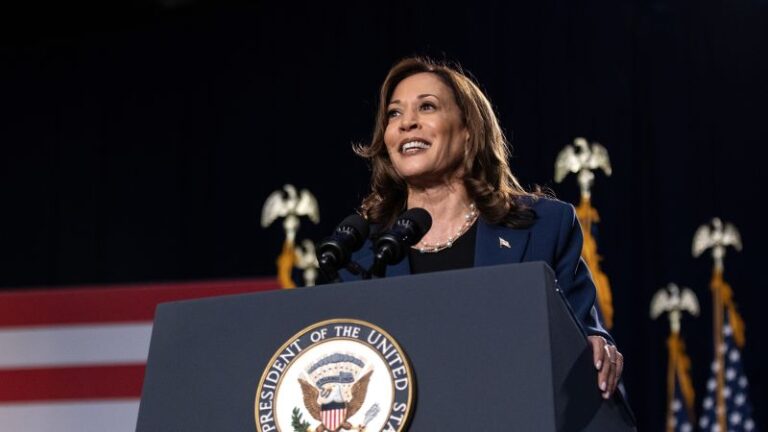CNN
—
Kamala Harris stands on the doorstep of history.
If selected to succeed President Joe Biden, Harris, whose father is Jamaican and mother is Indian, would not only be the first woman to serve as president, but also the first Indian-American, first Asian person to serve as president, first black woman to serve as president and first person of Jamaican descent to serve as president.
And Democratic donors everywhere are eager to help Harris get there.
“Her multiple identities are actually her superpower at this point,” said Glinda Carr, CEO of Higher Heights for America, a group focused on increasing the political influence of black women.
Carr, like Harris, is a member of the storied Alpha Kappa Alpha sorority, whose members quickly donated a check for $19.08 to Biden’s campaign in 2020 to show their support for his running mate – a figure marking the year the organization was founded at Howard University, Harris’ alma mater.
Members of Harris’ sorority have once again sent a financial message: A source familiar with Harris’ fundraising said more than 1,500 contributions were deposited into her campaign account between Sunday afternoon, when Biden dropped out of the 2024 presidential race, and Monday evening, when the money was just $19.08 each.
Carr said he expects “all the founding dates” of the Divine Nine, as the country’s historically African-American sororities and fraternities are known, will be reflected on this year’s checks.
Political fundraisers across the country say they have witnessed a remarkable turnaround in Democrats’ cash flow since the donation blockade effectively ended when Biden withdrew following his poor performance in last month’s presidential debate.
The Harris campaign said it had raised a staggering $100 million through all of its fundraising committees between Sunday and Monday evening — far more than the $53 million the campaign touted it had raised after Trump was convicted in Manhattan of business fraud in May. More than 1.1 million donors have contributed, 62% of whom were first-time donors in this election, the Harris campaign said.
Alexandra Acker Lyons, a Denver-based Democratic donor adviser, said she began reaching out to her women donor network last Thursday as it became increasingly clear that the confusion over Biden’s continued candidacy showed no signs of abating. Now, she said, the door is open.
Donors are “just overwhelmingly excited” about Harris’ candidacy, said Acker Lyons, who also serves as political director for the Electing Women Alliance, a network of political donors focused on supporting female Democratic candidates who support abortion rights.
“One donor said, ‘I wasn’t thrilled to see my 2024 bingo card,'” she said.
Women aren’t the only ones celebrating Harris’ rise.
Ramesh Kapoor, an Indian-American businessman and veteran Democratic fundraiser, said her rise in national politics underscores that “as a community, we have really arrived in the United States.”
Kapoor said he held his first fundraiser for Harris at his home near Boston when she won the Senate election in 2016. Now, he is encouraging people of Indian descent to raise funds for her in the roughly three months leading up to Election Day.
“I’m really excited because she’s in my DNA,” he said.
Meanwhile in Virginia, Shekhar Narasimhan, an investment banker and chair of the AAPI Victory Fund political action committee, said a wide range of Asian Americans are “moving forward” to support Harris.
He said he’s received text messages, emails and Signal messages from people who have never donated before but who see themselves in her story as first-generation people born in the U.S. to immigrant parents.
“These are people who didn’t get the DNC email,” Narasimhan said, raising hopes that increased interest from first-time donors will translate into Democratic results in November.
“The breadth of her extraordinary origin story could broaden her base,” he said. “We always talk about how Trump has broadened the Republican base. From a purely electoral perspective, this could be the first opportunity in a long time for Democrats to broaden their base.”
Chintan Patel, executive director of the Indian American Impact Fund, said the fund saw a nearly 90% increase in contributions from new donors within 24 hours of Harris announcing her candidacy.
Patel said the group plans to make a seven-figure investment to mobilize voters, particularly South Asian and Asian American voters, in battleground states.
A higher-than-expected turnout among black women in battleground states such as Michigan and Wisconsin — where Biden won the 2020 presidential election by fewer than 21,000 votes out of 3.3 million total votes — could give Harris the “margin of victory” in November’s election, Carr of Higher Heights said.
But despite the early enthusiasm, groups backing Harris say major challenges remain, both in maintaining her campaign’s early financial momentum and blunting looming attacks on her race and gender.
Carr said Harris’ political opponents have repeatedly and deliberately mispronounced her name as a “whistle blow to Americans who don’t believe she can lead.”
Harris has “run, won and governed at every level of government,” she said. “If there was a resume without her name and pronouns on it, people would say, ‘This person should be president.'”
Acker-Lyons said he is encouraging his donor network to invest more money not only in Harris’ campaign but also in outside groups ready to defend her and mobilize voters for her this fall.
“Some of our larger donors gave on the spot and we hope they will give again and continue to give another zero in the future.”
CNN’s Veronica Stracuarci contributed to this report.

